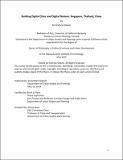Building Digital Cities and Digital Nations: Singapore, Thailand, China
Author(s)
Stokols, Sol Andrew
DownloadThesis PDF (10.56Mb)
Advisor
Ryan, Brent D.
Terms of use
Metadata
Show full item recordAbstract
Despite critiques of the “smart city,” the term has found new life in many parts of the world, morphing from a corporate marketing effort to an “imaginary” of national development. In the mid 2010s, the idea of a “Fourth Industrial Revolution” predicted that the emergence of 5G connectivity and the Internet of Things (IoT) would enable an even greater extraction of data from physical environments and objects. Around this time, three countries compared in this dissertation adopted these ideas into their national development plans: Singapore’s Smart Nation (2014), Thailand 4.0 (2016), and Made in China 2025 (2015). These policies also resulted in urban pilot projects including city data platforms, IoT sensor systems, and digital twins. How and why did the “smart city” and “4th IR” resonate with political leaders and national histories in these countries, and how is the trajectory of urban technologies in these contexts co-produced through an interplay between political institutions, culture, and material effects of technologies themselves? This dissertation draws on the perspectives of science and technology studies (STS), political science of late development, and urban theory to understand the implications of these experiments for the future of cities and more broadly, the future of data capitalism.
The dissertation draws on 10 months of fieldwork across three countries involving interviews with key stakeholders, process tracing of policy and project evolution, archival and policy analysis, site visits, and grounded theory development afforded by these different methods. In addition to serving as testbeds for the nation, pilot projects examined in each country are symbolic showcases shaped by visions of national identity and political dynamics. In Singapore, digital twins and embedding of IoT sensors in biotic environments transform the city into a showroom for the “urban solutions” sector and reinforce its identity as a “city in a garden.” In Thailand, the push for digitization of city data is intertwined with questions of sovereignty in a polity long dominated by its capital city and riven by persistent political unrest. Meanwhile in China, the development of Xiong’an New Area and its digital infrastructure is promoted as demonstrating a “new development concept” driven by indigenous innovation, digital urban services, and greater central control over urban development.
The rise of platform capitalism has been predicated on the value of data as an asset monopolized by private firms. Platform companies, eager for greater control over urban data, have tried to build new digital urban districts, exemplified by Google’s Quayside in Toronto, which failed due to citizens’ fear of more personal data being surrendered to a corporation. However, in the countries I examine in this dissertation, urban data is increasingly seen as a resource for development and public infrastructure. This leads to an effort by a range of stakeholders to claim sovereignty over that data—from nations passing laws on data sovereignty within their territorial borders, to cities and local leaders deploying data platforms as a resource for municipal governance and local development, to firms that seek to profit from the proliferation of urban data and analytical platforms. Urban data has become a crucial albeit contested domain of state infrastructural power. The dissertation offers a new understanding of the transmutation of urban concepts in diverse contexts, and calls for planners and urban scholars to engage in reimagining alternative urban futures.
Date issued
2024-05Department
Massachusetts Institute of Technology. Department of Urban Studies and PlanningPublisher
Massachusetts Institute of Technology